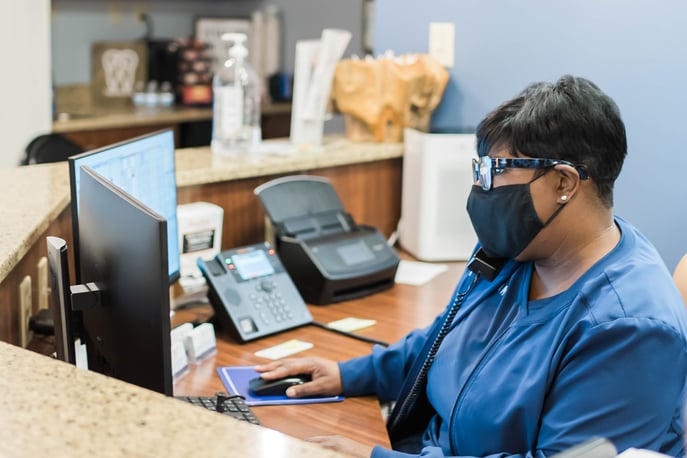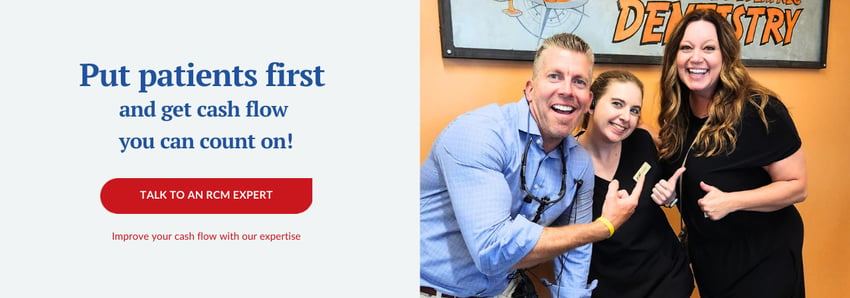3 dental billing topics to know for a more profitable revenue cycle in your DSO


As the revenue cycle manager of your Dental Service Organization (DSO) team, you’re aiming to set everyone up for success. You want your team to be in tip-top dental billing shape to service all dental offices at maximum efficiency.
We all know the importance of collection percentage, right?
Collection Percentage = Total collections/Net Production
Did you know that most DSOs set a collection percentage goal of 92%... What?! That means you’re missing out on 8% of the revenue produced. Why set such a low goal?
That missing 8% might seem like a small number, but why shouldn’t the aim be to collect 100%? You want to be collecting everything the dental practice has produced so that you’re hardly writing off anything. Shouldn’t your DSO team be aiming higher?
To give the dentists you serve in your DSO the most value, you might ask yourself, “Is there something else I could be doing to make my DSO team more successful?” The answer is yes.
As a dental billing service provider, Dental ClaimSupport has worked with DSOs and seen them still struggle to run an efficient dental billing process, just like many in-house dental teams do. DSOs grow by acquiring and contracting with more dental practices. The more they serve, the more challenging and overwhelming the billing becomes.
In this article, you will learn how educating your DSO team on 3 dental insurance billing and coding topics can be a tremendous benefit in helping everyone, including the dental office be more successful.
The topics:
Steps of the insurance billing process
Current Dental Terminology (CDT) changes
Why would a Dental Service Organization need billing education?
A DSO is a company that acquires a dental practice and therefore takes over the operations, marketing, and administration of the office - including insurance claim support. Similar to outsourced dental billing companies, DSOs typically have centralized billing locations or billing teams that handle the revenue cycle for multiple dental offices.
As your DSO acquires more and more dental offices, they will need to hire and manage more billers to deal with insurance companies. It’s important that these billers have thorough, up-to-date education in insurance billing. Understanding the need for clear steps, and efficient processes will help your DSO team bring in more money for their practices. Dealing with dental insurance requires continuous education as policies, dental codes and regulations constantly change.

Most dental insurance billing education programs target the needs of in-house dental teams or in-house insurance coordinators, but billers at DSOs need education too, and honestly, the dental billing process shouldn’t be too different, in the corporate DSO setting.
As a DSO, you probably have a formal way to train your billers, but are they continuously educated on the ever-changing rules and regulations of dental insurance and coding?
There are a few topics your billers should keep up-to-date on to ensure they maximize efficiency and profitability for themselves and their dental offices' affiliates.
1. Coordination of Benefits (COB)
No one loves learning about COB, but it’s a crucial piece of the insurance billing puzzle. Your DSO team should feel confident handling patients with multiple insurance plans, and understand how to handle these claims, and know the rules of COB.
By understanding COB and how to calculate the patient’s total financial responsibility, the billing coordinator can reduce or in some instances, eliminate the PPO write-off when there is more than one plan. So, yes, understanding COB is crucial to practice profitability.
You can learn about COB by taking our on-demand CE course on the Coordination of benefits or reading about it on Center for Medicare and Medicaid Services website.
2. Steps of the dental insurance billing process
Does your DSO team know the step-by-step process of the dental insurance billing process? The average turnaround time for claims sent and paid in DSOs is 40 days. It doesn’t have to be this long!
Because our billers work exclusively on insurance claims as remote employees, they have to follow a very structured dental billing schedule for themselves. Your employees don’t have to work remotely to do this, though. Anyone working in insurance billing should be on a schedule that prioritizes keeping track of claims and appealing denials.
There should be a process from appointment to claim creation to payment posting, ensuring no claim falls through the cracks and your company receives the highest reimbursement from insurance. Educating your team on this process is the best way to streamline your DSOs revenue. You can get training on our process in this on-demand course: All about sending dental insurance claims.
Want a step-by-step guidebook for the dental billing process? Get your copy of Ultimate Guide to Dental Billing & Reporting.
3. Current dental terminology (CDT) coding
What’s just as important as COB and an efficient billing process? Welcome to CDT coding! It’s the standard language for officially reporting dental services to other groups, including dental insurance companies. CDT codes are always changing and keeping up with new codes and documentation requirements can get pretty tedious. Your team can maximize profits and maintain compliance by knowing and understanding CDT coding.
CDT codes are revised, added, or deleted every year, so it’s definitely something your DSO team should stay up to date on. How well your billers know and applying these codes will determine the accuracy of their claims, and how successful they are in collecting payment.
The CDT defines what properly documents which procedures were performed and why they were necessary. If used incorrectly, insurance can deny the dental practice’s claim, and the claim may even be found fraudulent in a later review
So, even though your DSO billing team isn’t the one performing procedures, these employees should know what each code means in order to successfully submit claims. You can get training on the most important CDT changes in the Dental Claims Academy.
Ready to take your DSO team’s dental billing education to the next level?
Although a DSO is a corporate entity that owns dental offices, you’re never too big to need proper education, especially when it comes to dental billing. It is the source of every DSO’s income, and managing this revenue well gives your DSO a big competitive advantage.
Dental ClaimSupport offers an educational platform that covers all of the above topics: COB, dental billing process and best practices, and CDT coding. Sign your team up to have them continuously educated on these topics that directly affect each dental practice’s revenue, and watch their success benefit you and the dental practices you serve.
Dental Claims Academy is available for anyone hoping to deep dive into the world of dental billing. It offers webinars, courses with quizzes, and forums in which you can chat with fellow students and billing experts.
Related Posts
Dental revenue resources from Dental Claim Support

